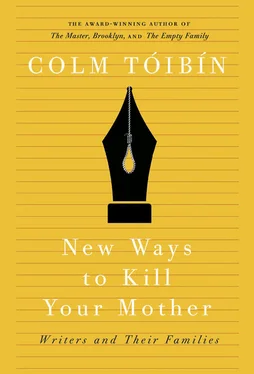Baldwin understood the singular importance of the novel in America because he saw the dilemma his country faced as essentially an interior one, a poison that began in the individual spirit and only made its way then into politics. His political writing remains as raw and vivid as his fiction because he believed that social reform could not occur through legislation alone but through a reimagining of the private realm. Thus, for Baldwin, an examination of the individual soul as dramatized in fiction had immense power. It was, in the end, he saw, a matter of love, and he was not afraid to use the word. In his 1962 New York Times article he wrote:
The loneliness of the cities described in Dos Passos is greater now than it has ever been before; and these cities are more dangerous now than they were before, and their citizens are yet more unloved. And those panaceas and formulas which have so spectacularly failed Dos Passos have also failed this country, and the world. The trouble is deeper than we wish to think: the trouble is in us. And we will never remake those cities, or conquer our cruel and unbearable human isolation — we will never establish human communities — until we stare our ghastly failure in the face.
Before he began to publish fiction, Baldwin was a reviewer with attitude, a writer with a high sense of aesthetic grandeur, an Edmund Wilson with real poison in his pen. In the New Leader in December 1947, for example, the twenty-three-year-old Baldwin employed a triple negative to take a swipe at Erskine Caldwell’s The Sure Hand of God : ‘Certainly there is nothing in the book which would not justify the suspicion that Mr Caldwell was concerned with nothing more momentous than getting rid of some of the paper he had lying about the house, resurrecting several of the tired types on which he first made his reputation, and (incidentally) making a few dollars on the deal.’ Earlier that same year, he took on Maxim Gorky: ‘Gorky, not in the habit of describing intermediate colors, even when he suspected their existence, has in Mother written a Russian battle hymn which history has so summarily dated that we are almost unwilling to credit it with any reality.’ Gorky, he went on, ‘was the foremost exponent of the maxim that “art is the weapon of the working class.” He is also, probably, the major example of the invalidity of such a doctrine. (It is rather like saying that art is the weapon of the American housewife.)’
Moving from Russia with careful, youthful deliberation and delight, Baldwin in August 1948 did something close to many serious novelists’ hearts. He took on a popular writer much praised for his terse style and pace, in this case poor James M. Cain, author of The Postman Always Rings Twice . Baldwin considered Cain’s body of work: ‘Not only did he have nothing to say,’ he wrote,
but he drooled, so to speak, as he said it… He writes with the stolid, humorless assurance of the American self-made man. Rather a great deal has been written concerning his breathless staccato ‘pace,’ his terse, corner-of-the-mouth ‘style,’ his significance as a recorder of the seamier side of American life. This is nonsense: Mr Cain writes fantasies and fantasies of the most unendurably mawkish and sentimental sort.
In January 1949 in an essay in Commentary , Baldwin formulated what would become his characteristic battle cry, which would so puzzle and irritate white liberals and reformers in the 1960s when they found they had reason to listen to him — the problem in America, he believed, lay in each individual American soul, black as much as white; and the black population was not seeking equality with a white world that had so significantly failed to understand itself, let alone those whom it had oppressed. ‘In a very real sense,’ he wrote in that essay,
the Negro problem has become anachronistic; we ourselves are the only problem, it is our hearts that we must search. It is neither a politic nor a popular thing to say, but a black man facing a white man becomes at once contemptuous and resentful when he finds himself looked upon as a moral problem for that white man’s conscience.
In March 1950 Baldwin published a short story in Commentary called ‘Death of a Prophet’, which he did not collect in Going to Meet the Man . It was, as far as I can make out, his second piece of published fiction. The first — also published in Commentary , in October 1948 — called ‘Previous Condition’, was included in Going to Meet the Man and contained a few of the elements that went into Another Country . It is easy to see why Baldwin did not want to publish ‘Death of a Prophet’ in a collection, as it too obviously contained the seeds of Go Tell It on the Mountain , being the story of a boy in Harlem whose father was a preacher. The subject of a father and his son, Baldwin knew, was an interesting one. In 1967, in a review in the New York Review of Books , he wrote: ‘The father–son relationship is one of the most crucial and dangerous on earth, and to pretend that it can be otherwise really amounts to an exceedingly dangerous heresy.’
Although the story of the father and son told in ‘Death of a Prophet’ and Go Tell It on the Mountain was, to a large extent, his own story, recounted also in some autobiographical essays, Baldwin understood that the tension between the generations of men was a quintessential American story. It was, he believed, not only what set America apart, but what disfigured his country — the shame, the lack of pride sons in a society moving onwards and upwards felt at their fathers.
Thus his work in his fiction, and even in a novel like Another Country , notable for the absence of fathers, dealt with a most public and pressing matter in the most private and personal way. In an essay in 1964 Baldwin formulated the theory of this:
And what happens to a person, however odd this may sound, also happens to a nation… The Italian immigrant arriving from Italy, for example, or the sons of parents who were born in Sicily, makes a great point of not speaking Italian because he’s going to become an American. And he can’t bear his parents because they are backward. This may seem a trivial matter. But it is of the utmost importance when a father is despised by his son, and this is one of the facts of American life, and this is what we are really referring to, in oblique and terrible fashion, when we talk about upward mobility.
The writing in ‘Death of a Prophet’ is high-toned, almost overwrought at times, but pitched with zeal and serious ambition and great tenderness. The story is what Baldwin himself called in a review in the New Leader in September 1947 ‘a study of human helplessness’; it sees the character of Johnnie, whose father is dying, and who has become a stranger in his father’s eyes, not ‘in relation to oppression’, as Baldwin put it in another piece on Gorky in 1947, but in relation to the character’s own fear and inadequacy. Baldwin, even as he began, and despite his deep awareness of the relationship between the political and the personal, was determined that his characters should not be confined by a narrow political agenda; he sought to ensure that the behaviour and the failure of his characters should be seen first as particular and private and then only as part of some general malaise that took its bearings from the Fall of Man as much as the creation of slavery, and emphatically not from a predetermined role as black men oppressed by bad laws. He also wanted to follow the example of Robert Louis Stevenson, whose novels and stories he reviewed in January 1948; he wanted to write, as Baldwin put it, ‘superbly well’ and know that this would be, as with Stevenson, ‘the most enduring delight’. Baldwin wished to create and live as an American and as a man, and had much to say about the state of his nation and about its masculinity. (In April 1966 he wrote: ‘Much of the American confusion, if not most of it, is a direct result of the American effort to avoid dealing with the Negro as a man.’) He was helped by his insistence that he did not belong to anyone’s margin and his ability in the same moment to take possession of the margin when it suited his purpose. He relished the ambiguity of his position and was skilled at covering his tracks.
Читать дальше












